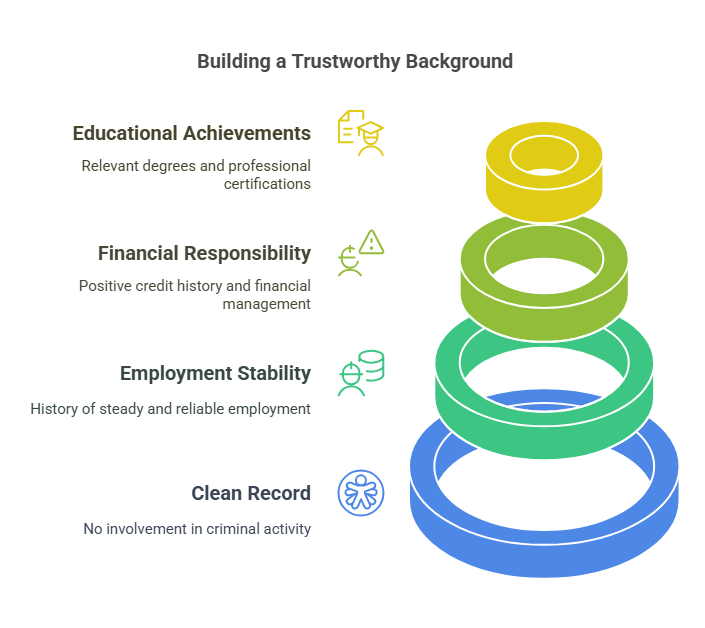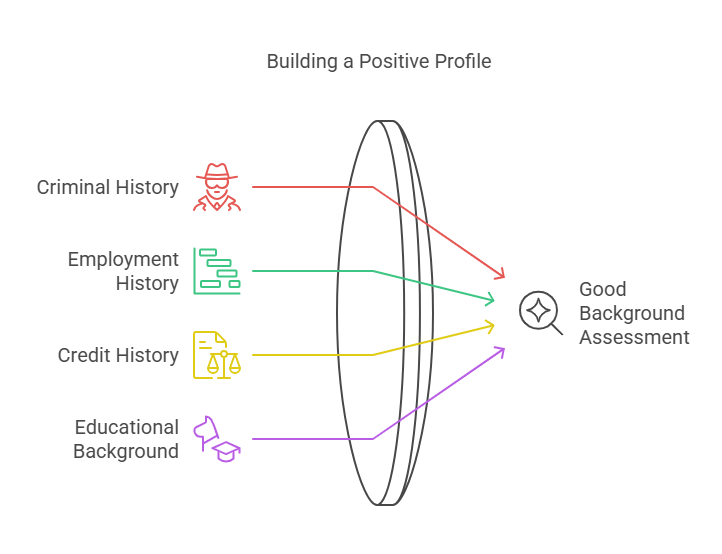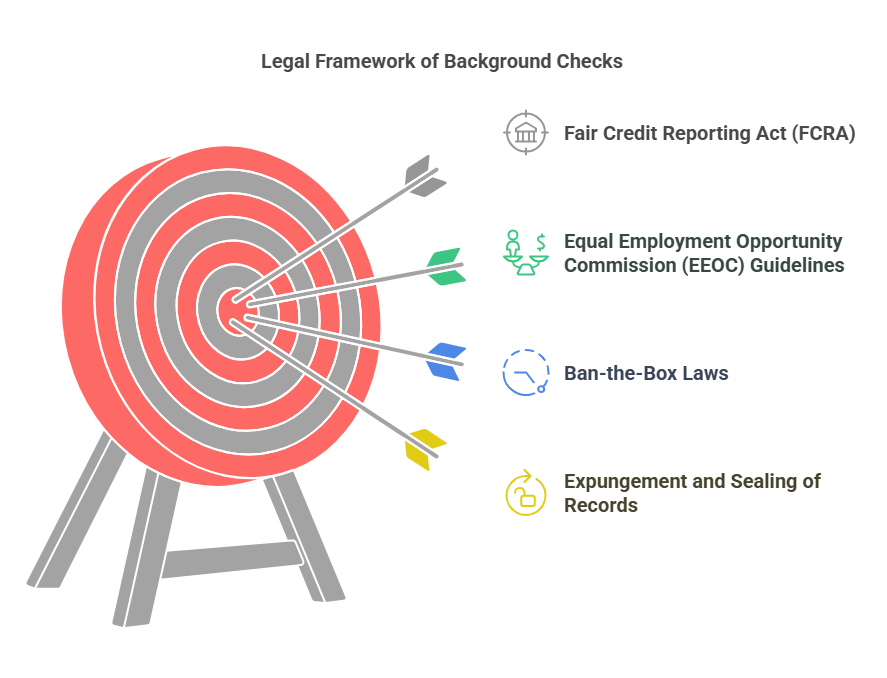A Guide to Maintaining Good Backgrounds

Introduction and Understanding What a Good Background Shows
In today’s competitive world, whether it’s for employment, housing, or security clearance, having a “good backgrounds” is essential. But what exactly does a “good background” mean in the context of background checks? Understanding this concept is crucial, as it directly impacts opportunities for employment, tenancy, and other areas where trust and reliability are essential. In this article, we will break down the elements that define a good background, the role it plays in various situations, and what employers, landlords, and organizations typically look for during a background screening process.
What Makes a “Good Background”?

A “good background” is often synonymous with a clean record or one that demonstrates stability, responsibility, and trustworthiness. While the specific criteria for a good background can vary depending on the context (employment, tenancy, or security clearance), there are common elements that are generally considered positive:
- Clean Criminal Record: A good background shows that an individual has not been involved in criminal activity. Having no criminal convictions or a history of serious offenses is crucial in many situations, especially for high-security roles and jobs involving sensitive information.
- Stable Employment History: Employment stability is another key component of a good background. Employers typically seek candidates who have a history of steady employment, showing they are dependable and committed to their roles.
- Positive Credit History or Financial Responsibility: A clean financial record, including a positive credit history, is an important aspect of a good background, especially for roles that involve handling money, finance, or sensitive financial data.
- Educational Achievements and Certifications: A good background also includes evidence of relevant education, degrees, or certifications that align with the job or role being applied for. These credentials demonstrate that an individual is qualified and capable.
How a Good Background Influences Hiring Decisions, Tenant Applications, and More
Whether applying for a job, a rental property, or a government clearance, a good background plays a crucial role in the decision-making process. Let’s explore how a good background can impact various situations:
- Employment: Employers typically conduct background checks to verify the qualifications and integrity of potential candidates. A candidate with a good background—no criminal history, solid work experience, and a good credit score—is more likely to be seen as a reliable and trustworthy employee. In contrast, discrepancies or red flags in a candidate’s background (e.g., a criminal conviction or inconsistent employment history) could reduce their chances of being hired.
- Tenancy: Landlords and property managers often conduct background checks on potential tenants to assess their reliability as renters. A good background in this context includes a clean criminal record (to ensure safety for other tenants), positive references from previous landlords, and evidence of financial responsibility (such as a solid credit score or history of paying rent on time). A good background can help secure a rental property, while a poor background may result in the rejection of a rental application.
- Security Clearance and Sensitive Roles: For jobs that require access to sensitive information or security clearance, a good background is paramount. This includes not only a clean criminal record but also a history of trustworthiness, loyalty, and stability. Background investigations for such positions are often more in-depth and may involve reviewing past financial records, personal relationships, and even social media activity.
Examples of Situations Where a Good Background is Critical
- High-Security Jobs: Positions in government agencies, military, and roles requiring national security clearance require individuals to have an excellent background. These roles involve access to sensitive or classified information, so a good background, free from criminal activity or financial instability, is critical to ensure the safety and confidentiality of national security operations.
- Managerial Positions: In managerial roles, employers look for candidates with a good background to demonstrate leadership capabilities, trustworthiness, and the ability to make sound decisions. A stable employment history, coupled with a clean criminal record, is particularly important when managing people or finances.
- Client-Facing Roles: Jobs that involve direct interaction with clients, such as in the healthcare, finance, or customer service sectors, often require a good background. Employers want employees who are responsible, trustworthy, and dependable, particularly when handling clients’ personal or financial information.
Types of Positive Information Typically Considered Part of a “Good Background”

When evaluating a candidate’s background, several types of positive information contribute to the overall assessment of whether the individual has a “good background.” These include:
- Criminal History: A clean criminal record is often the most important factor when determining whether someone has a good background. Employers, landlords, and security agencies prefer individuals without any history of serious criminal activity.
- Employment History: A stable and reliable employment record, showing consistent work over a reasonable period, signals that the individual is dependable and likely to perform well in future roles. Positive references from past employers or colleagues can also strengthen a candidate’s background.
- Credit History and Financial Responsibility: A good credit score or financial responsibility is particularly relevant for positions that involve managing financial transactions, banking, or similar responsibilities. Employers may check for evidence of responsibility in managing personal finances, including timely bill payments and avoiding excessive debt.
- Educational Background and Certifications: Employers often look for relevant education or certifications to ensure that candidates have the necessary skills and knowledge for the role. A good educational background is particularly important for roles that require specialized training, such as in healthcare, engineering, or education.
Factors That Influence a Good Background
While the criteria for a “good background” are generally similar across various fields, there are specific factors that affect whether an applicant’s background is viewed positively. These factors can vary depending on the context of the background check—whether for employment, housing, or other purposes.
1. The Length of Employment and Job Stability
Employment History is one of the most important factors in determining if an individual has a good background, especially in employment-related background checks. Employers look for a consistent and stable work history, as it shows reliability and professionalism. Gaps in employment or a pattern of job-hopping might raise questions about the applicant’s work ethic, stability, and long-term commitment.
For example:
- Steady Employment: A candidate who has held a steady job with one or two employers over several years demonstrates a high level of reliability and dedication. This kind of work history is seen as a positive indicator of an applicant’s professionalism and commitment.
- Frequent Job Changes: Frequent job changes (especially without legitimate reasons) might raise red flags for potential employers. They could be perceived as signs of instability or a lack of commitment.
2. The Type of Criminal Record (If Any)
Another critical element in determining whether an individual has a “good background” is their criminal history. A clean criminal record, free of serious offenses, plays a significant role in enhancing the quality of an applicant’s background.
However, even a criminal record doesn’t necessarily disqualify someone from being considered for a job or tenancy. The severity of the offense and the nature of the crime are taken into account, as well as how long ago the conviction occurred and whether it has been expunged.
- Serious Criminal Offenses: Serious criminal offenses, such as felonies, violent crimes, or sex offenses, will often have a more significant impact on an applicant’s background. These types of offenses might disqualify someone from roles requiring high trust or access to sensitive information.
- Misdemeanors: A misdemeanor, such as a minor drug offense or public disturbance, might not necessarily be a barrier to employment or tenancy. However, some employers or landlords may choose to consider these factors in specific roles (e.g., customer-facing or safety-sensitive positions).
- Expungement or Sealing of Records: If an individual has had their criminal record expunged or sealed, it may not appear on background checks, improving their prospects. Expungement allows a person to move on from their past offenses and re-enter the job or housing market with a cleaner slate.
3. Financial History and Credit
A good financial record is another key component of a good background. Employers and landlords often look at an applicant’s credit history to gauge financial responsibility, especially for roles that involve handling money, sensitive data, or financial transactions. A strong credit history indicates that the applicant is responsible with their finances and is less likely to face financial distress or instability.
However, an applicant’s financial history might be considered in different ways depending on the role:
- Financial Roles: For jobs in banking, accounting, or financial management, a clean credit history is a must. Employers want to ensure that the person they hire is financially responsible and won’t be tempted to engage in unethical behavior.
- General Employment: For non-financial roles, credit checks are often used to gauge an applicant’s level of responsibility. While a poor credit score might not disqualify someone from a job, it could indicate potential challenges, such as financial distress or irresponsibility.
4. Educational Achievements and Certifications
Education and certifications contribute to an applicant’s background in a significant way. Employers look for candidates with the relevant academic qualifications or certifications that align with the job role. This factor is especially important for specialized fields like healthcare, technology, or education.
- Relevant Degrees and Certifications: Having the right degree, diplomas, or industry certifications demonstrates that the candidate has the necessary knowledge and skills for the role. For example, a healthcare provider or engineer must have specific credentials, which are considered part of a good background.
- Academic History: A strong academic history, such as honors or achievements in education, can reflect well on an applicant’s commitment and work ethic. Employers may give preference to candidates with strong academic records, particularly for roles requiring specialized knowledge.
5. Industry-Specific Criteria for a Good Background
Certain industries or roles may have specific requirements that influence what constitutes a “good background.” For example:
- Healthcare: In the healthcare industry, having a clean criminal record, valid medical certifications, and a history of trustworthy patient care are critical. A candidate with any history of malpractice or abuse would likely face rejection.
- Finance: In finance, beyond educational qualifications, employers will look at an individual’s financial integrity, including whether they have any bankruptcies or significant debts. A strong financial record is key for roles that involve managing money.
- Education: For teachers and educational staff, a good background includes not just a clean criminal record but also verified credentials and experience. Educators are often required to undergo additional background checks to ensure that they are suitable for working with children.
Exact Background Checks: Our Services
At Exact Background Checks, we understand the importance of a good background and its impact on hiring, renting, and security clearance decisions. We provide comprehensive background screening services that give employers and landlords the information they need to make informed decisions. Our services include:
- Criminal Background Checks: We thoroughly investigate an applicant’s criminal history, ensuring that it is both complete and accurate.
- Employment and Education Verification: We verify employment histories and educational qualifications to confirm that applicants meet the necessary criteria.
- Credit History Checks: For roles that involve financial responsibility, we perform detailed credit checks to assess the applicant’s financial reliability.
- Tailored Screening Services: We offer customized screening packages tailored to the specific needs of various industries, whether it be healthcare, finance, education, or government.
By using our professional services, organizations can ensure that their candidates meet the standards for a good background, ultimately leading to more reliable hires and better outcomes.
Summary of What Constitutes a “Good Background”
To summarize, a “good background” typically includes:
- A clean criminal record (with considerations based on the severity of offenses).
- A stable and reliable employment history.
- A positive credit and financial record (particularly for financial roles).
- Educational qualifications and professional certifications relevant to the role.
Each factor plays a vital role in determining whether an applicant is seen as trustworthy and suitable for a given role. Exact Background Checks offers tailored services to help both individuals and organizations assess these factors accurately.
Legal Aspects of Background Checks

Background checks are subject to a variety of federal, state, and local laws designed to protect the rights of individuals while ensuring that employers and organizations make informed decisions. These legal frameworks help ensure that background investigations are conducted fairly, consistently, and transparently.
1. Fair Credit Reporting Act (FCRA)
One of the most significant pieces of legislation governing background checks is the Fair Credit Reporting Act (FCRA). This federal law regulates how background checks are conducted, particularly when they are used for employment purposes. The FCRA ensures that:
- Individuals must give written consent before a background check can be conducted.
- Employers must notify candidates if an adverse decision (such as rejection of an employment application) is based on information found in a background check.
- Individuals have the right to dispute inaccuracies in their background reports, including criminal history, credit reports, and other personal information.
2. Equal Employment Opportunity Commission (EEOC) Guidelines
The Equal Employment Opportunity Commission (EEOC) provides guidelines that ensure employers do not discriminate against applicants based on criminal history. According to the EEOC:
- Employers must evaluate the nature of the offense, the time that has passed, and its relevance to the job before considering criminal history in their hiring decision.
- Employers are prohibited from having blanket policies that automatically disqualify individuals with criminal convictions. Instead, employers must make individualized assessments, considering factors such as the type of offense, the job requirements, and the candidate’s rehabilitation efforts.
For example, a misdemeanor conviction may not be an automatic disqualifier for all jobs, particularly if the conviction is unrelated to the job duties.
3. Ban-the-Box Laws
Many states and localities have adopted ban-the-box laws, which restrict employers from asking about criminal history on job applications. These laws aim to give individuals with criminal records a fairer chance at employment by delaying the inquiry into their criminal background until later in the hiring process.
While these laws vary by jurisdiction, they generally require employers to:
- Remove questions about criminal history from initial job applications.
- Delay background checks until after the candidate has been interviewed or has received a conditional job offer.
These laws are part of a broader effort to reduce employment discrimination against individuals with past criminal convictions, allowing them to be judged on their qualifications rather than their criminal record.
4. Expungement and Sealing of Records
In many cases, individuals can have their criminal records expunged (removed) or sealed (restricted from public view). This process varies by state, but expungement typically involves a legal procedure where individuals apply to the court to have their criminal records erased, while sealing prevents the public from accessing the records.
If an individual’s record is expunged or sealed:
- The criminal conviction will generally not appear on a background check.
- The individual may be able to legally deny the existence of the conviction in most situations.
Expungement can significantly improve an applicant’s chances of being hired or approved for tenancy by presenting a “clean slate” in their background.
Frequently Asked Questions (FAQs)
To help clarify some common concerns, let’s address a few frequently asked questions about good backgrounds and background checks:
What are the key components of a "good background" in a background check?
good background" typically includes:
- A clean criminal record.
- A stable employment history.
- A positive credit history or financial responsibility.
- Relevant educational achievements and certifications.
How does a good background influence hiring decisions and tenant applications?
- Employment: Employers view candidates with good backgrounds as more reliable and trustworthy, increasing their chances of being hired.
- Tenancy: Landlords prefer tenants with clean criminal records, positive rental histories, and financial responsibility, making it easier to secure rental properties.
What types of positive information are typically considered part of a "good background"?
Positive information includes:
- A clean criminal history.
- A stable and reliable employment history.
- A good credit score and financial responsibility.
- Relevant educational background and certifications.
What legal aspects are important to consider when conducting background checks?
Key legal aspects include:
- Compliance with the Fair Credit Reporting Act (FCRA), which regulates how background checks are conducted.
- Adherence to Equal Employment Opportunity Commission (EEOC) guidelines, which prevent discrimination based on criminal history.
- Understanding and complying with "ban-the-box" laws, which restrict when employers can ask about criminal history.
- Knowing the laws around Expungement and sealing of records, as this can affect what shows up on a back ground check.
How do factors like length of employment, type of criminal record, and financial history influence a "good background"?
- Length of Employment: A stable, consistent work history indicates reliability and commitment.
- Type of Criminal Record: Serious offenses can significantly impact a background, while minor offenses may be considered differently.
- Financial History: A good credit score and responsible financial behavior show trustworthiness, especially for financial roles.
Conclusion
In this article, we’ve explored the concept of a “good background” and how it influences employment decisions, tenancy, and other contexts. We’ve highlighted the key elements that make up a good background, including criminal history, employment records, credit reports, and educational achievements. Additionally, we’ve examined the legal aspects surrounding background checks, such as compliance with the Fair Credit Reporting Act (FCRA), EEOC guidelines, and expungement laws.
Understanding what constitutes a good background and how it can affect your chances of success in various areas is essential, whether you are an applicant or an employer. By using services like Exact Background Checks, both individuals and organizations can ensure that they are navigating the background screening process in a compliant, accurate, and efficient manner.
Remember, background checks are just one part of evaluating a candidate or applicant, and a “good background” can vary depending on the industry, the job role, and the specific requirements of the organization. By being proactive and informed, you can ensure that your background presents you in the best light possible.



